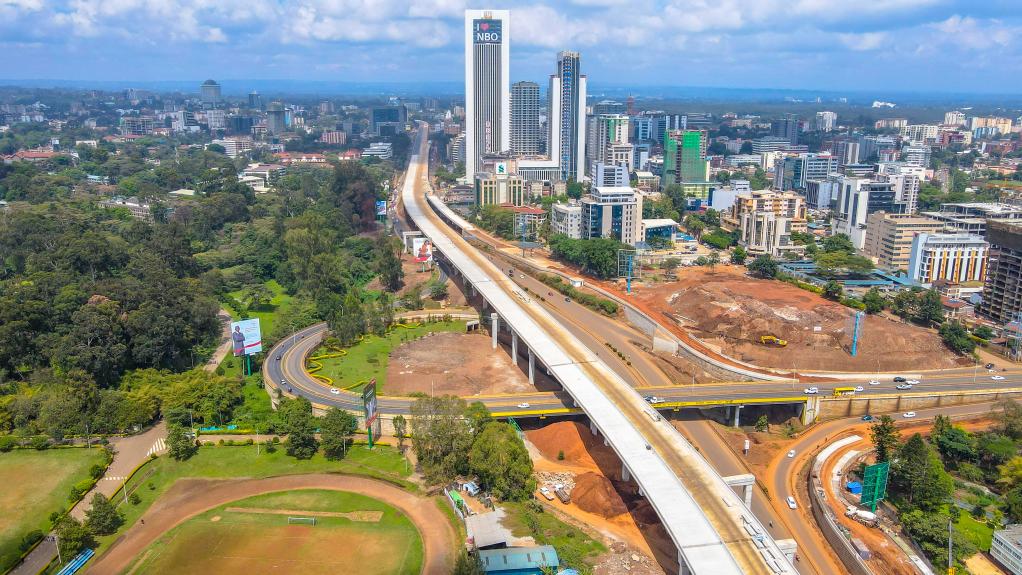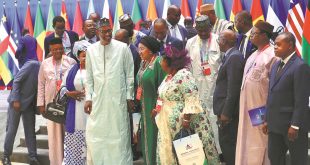Published: September 08,2022
By Dennis Munene

Photo taken on Dec 7, 2021, shows a section of the 27.1-km Nairobi Expressway which is being constructed by the China Road and Bridge Corporation (CRBC) in Nairobi, Kenya. [Photo/Xinhua]
Africa stands to benefit from all its multilateral engagements with major countries.
The continent has risen to become the world’s largest free trade area measured by the number of countries participating. The African Continental Free Trade Area has created an entirely new development path by harnessing Africa’s resources and the potential of its market, which has approximately 1.4 billion people in 55 countries.
Today, African countries in partnership with major countries such as China have, amid the COVID-19 pandemic, fostered economic, social, health and structural reforms that could pave the way for sustainable development. Through these multilateral engagements, the United Nations Conference on Trade and Development said in a report in June that foreign direct investment to African countries hit a record of $83 billion in 2021, despite the severe impacts of the pandemic.
In addition, the 21st-century scramble for Africa has seen an increase in multilateral engagements, such as the Russia-Africa Summit, the US-Africa LeadersSummit, the EU-Africa Business Forum, the Forum on China-Africa Cooperation and the Tokyo International Conference on African Development.
All these multilateral engagements in one way or another have transformed Africa through programs focusing on strengthening Africa’s democracy, human rights, peace and security, infrastructure development, trade and financial cooperation, among others.
However, some of these initiatives have infringed on Africa’s sovereignty and governance system and imposed stringent measures that have scuttled the growth and development of the continent, while others such as FOCAC have transformed Africa into a global powerhouse of development and growth.
In 2019, during the seventh Tokyo International Conference on African Development, then Japanese prime minister Shinzo Abe pledged to invest $20 billion over three years through Japan’s private sector, with a focus on advancing Africa’s development through people, technology and Innovation. However, due to the pandemic, very little progress has been made on the promises.
On Aug 27 and 28, Tunisia hosted the eighth Tokyo International Conference on African Development.
As a premier engagement of Japan with Africa, the conference series was established to promote high-level policy dialogue among participating African leaders and development partners and to mobilize support for African self-help development initiatives. However, some African scholars believe that the conference was established as a platform of using African countries to propel Japan to becoming a permanent member of the United Nations Security Council.
In 2003, at the third Tokyo International Conference on African Development, Japan called for the international community to support the New Partnership for Africa’s Development, a program of the African Union. However, the AU’s development agency has been rocked by controversies, with some African countries describing it as a “neoliberal initiative” mostly tailored to South Africa’s assets and interests at the risk of increasing regional and social disparities.
Nonetheless, 29 years after the establishment of the Tokyo International Conference on African Development, Japanese investors and companies don’t seem confident about doing business in Africa, despite the launch of the JETRO Japan-Africa Business Forum& Expo.
Figures show that as of 2019, approximately 796 Japanese companies were operating in Africa, compared with the more than 10,000 Chinese investors and companies in Africa.
Furthermore, with Japanese companies’ low confidence about doing business in Africa, Japan has almost no trade-related agreements with African countries, beyond standard duty, quota-free programs for least-developed countries. Only four African countries-Egypt, Morocco, South Africa and Zambia-havetaxation agreements with Japan.
On the other hand, entering the new era, President Xi Jinping put forward the principles of China’s Africa policy, centered on sincerity, real results, amity and good faith while pursuing the greater good and shared interests, charting the course for China’s cooperation with Africa. These principles have epitomized China’s foreign policy with Africa.
China-Africa relations have grown steadily over the decades and developed into one of the greatest stories of the 21st century.
Under the framework of the Forum on China-Africa Cooperation, China is helping to transform Africa into a global economic giant through the implementation of the nine Dakar Action Plan programs in the areas of health and medicine, poverty alleviation and agricultural development, trade promotion, investment promotion, digital innovation, green development, capacity building, cultural and people-to-people exchanges, and peace and security.
As Africa looks forward to the outcomes of the eighth Tokyo International Conference on African Development, the continent needs to use the African Union’s Agenda 2063 as its blueprint and strategy in engaging with its multilateral stakeholders to ensure win-win cooperation.
The author is executive director of the China-Africa Center at the Africa Policy Institute in Kenya.
China Daily Global
 Africa -China Review Africa -China Cooperation and Transformation
Africa -China Review Africa -China Cooperation and Transformation
